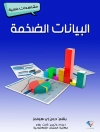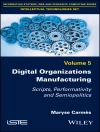Information is an element of knowledge that can be stored, processed or transmitted. It is linked to concepts of communication, data, knowledge or representation. In a context of steady increase in the mass of information it is difficult to know what information to look for and where to find them. Computer techniques exist to facilitate this research and allow relevant information extraction. Recommendation systems introduced the notions inherent to the recommendation, based, inter alia, information search, filtering, machine learning, collaborative approaches. It also deals with the assessment of such systems and has various applications.
Inhoudsopgave
Introduction vii
Chapter 1. A Few Important Details Before We Begin 1
1.1. Information systems 1
1.2. Decision support systems 2
1.3. Recommender systems 3
1.4. Comparisons 4
1.5. Recommendation versus personalization 5
1.5.1. Recommendation 5
1.5.2. Personalization 6
Chapter 2. Recommender Systems 7
2.1. Introduction 8
2.2. Classification of recommender systems 9
2.2.1. Classification by score estimation method 9
2.2.2. Classification by data exploitation 10
2.2.3. Classification by objective 11
2.3. User profiles 11
2.4. Data mining 12
2.5. Content-based approaches 14
2.6. Collaborative filtering approaches 17
2.7. Knowledge-based approaches 20
2.8. Hybrid approaches 23
2.9. Other approaches 25
Chapter 3. Key Concepts, Useful Measures and Techniques 29
3.1. Vector space model 31
3.2. Similarity measures 31
3.2.1. Cosine similarity 31
3.2.2. Pearson correlation coefficient 32
3.2.3. Euclidean distance 33
3.2.4. Dice index 33
3.3. Dimensionality reduction 34
3.3.1. Principal component analysis 34
3.3.2. Singular value decomposition 35
3.3.3. Latent semantic analysis 36
3.4. Classification/clustering 36
3.4.1. Classification 36
3.4.2. Clustering 37
3.5. Other techniques 39
3.5.1. Term frequency-inverse document frequency (TF-IDF) 39
3.5.2. Association rules 40
3.6. Comparisons 41
Chapter 4. Practical Implementations 43
4.1. Commercial applications 43
4.1.1. Amazon.com 43
4.1.2. Netflix 45
4.2. Databases 46
4.3. Collaborative environments 48
4.4. Smart cities 49
4.5. Early warning systems 54
Chapter 5. Evaluating the Quality of Recommender Systems 57
5.1. Data sets, sparsity and errors 57
5.2. Measures 59
5.2.1. Accuracy 59
5.2.2. Other measures 63
Conclusion 65
Bibliography 67
Index 77
Over de auteur
Elsa Negro has a Ph D in computer science and is professor at Paris-Dauphine University, France. She is particularly interested in decision-making information systems, recommendation systems, intelligent digital cities and crisis management.












